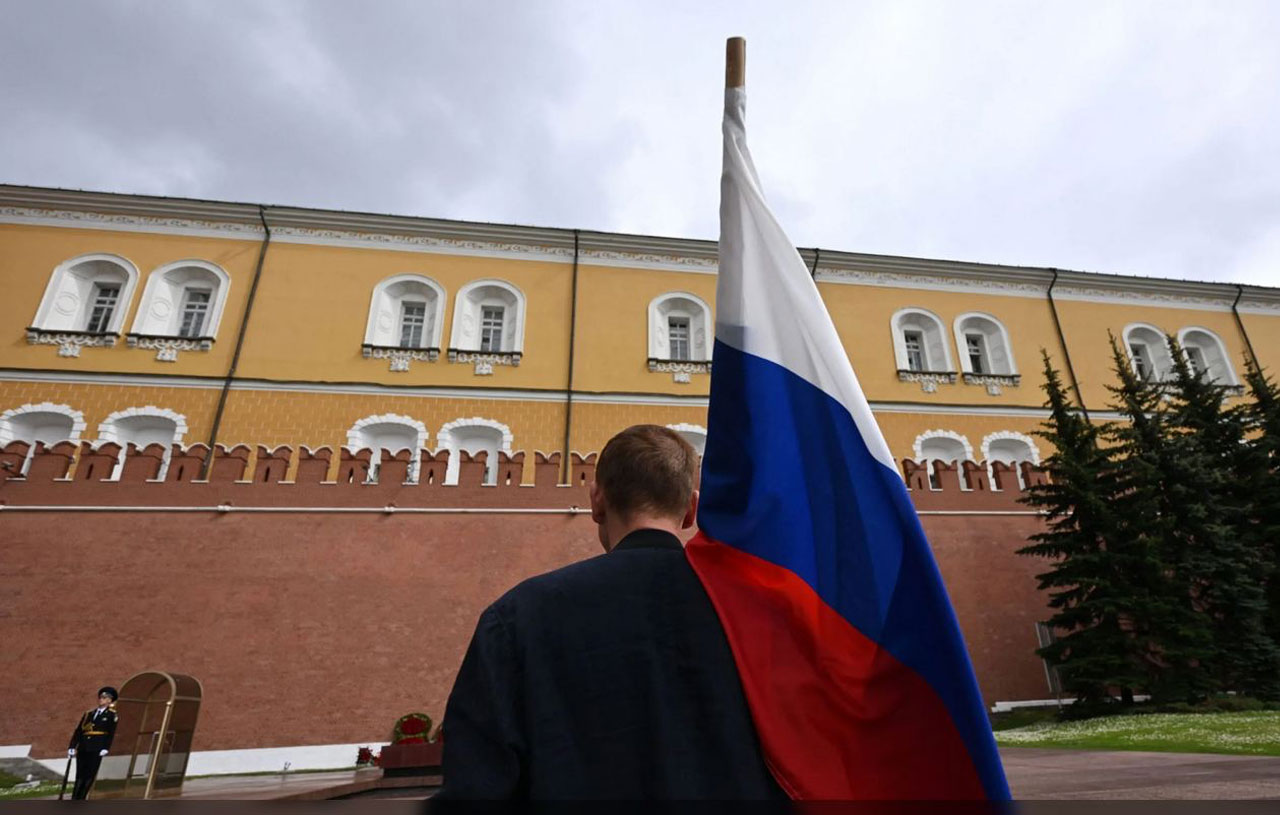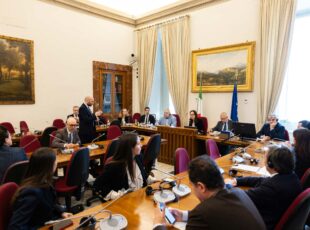Khodorkovsky: Revolutionary tactics will require using one group of Kremlin gangsters against another

Putin’s democratic opponents refuse to see that his regime, in its current form, can’t be brought down by elections or peaceful street protests — force or the threat of violence will be needed.
Quite often, in the comments to my posts in Russian — mostly left by Russians living in Russia — people write that they’re exhausted with all the incessant talk on social networks and that it’s time to do something to topple the regime of President Vladimir Putin. They often directly suggest I start funding paramilitary organizations based in Ukraine, like the Russian Volunteer Corps or the Free Russia Legion.”
But the majority of Russians living abroad who actively denounce Putin object to any violent action. In fact, they’re even against calls for nonviolent action from abroad, as they might ultimately lead to violence inside Russia against political activists, worsening their plight.
And the rebellion led by the paramilitary leader Yevgeny Prigozhin starkly exposed this split in thinking.
From the very beginning, Prigozhin’s insurrection had the appearance of a mutiny from within the mafia state. At first, the Wagner boss wasn’t specifically challenging Putin — he was demanding the defense minister and the chief of the general staff be handed over to him, so he could deal with them himself. And given their low popularity within the active army, there the mutineer’s demand was met with understanding.
That being said, Prigozhin himself is a figure no better or worse than Putin — they are the same kind of gangster, the same kind of murderer. However, his actions did create an opportunity for a serious weakening of the regime and — given a fortuitous confluence of events — the possibility of regime change.
Without active support on the part of the army and/or populace, Wagner’s “March for Justice” on Moscow was doomed to fail. Had either supported Prigozhin’s advance, however, democratic political forces could have very well been able to replace the weakened regime through an uprising in the capital, which Putin and his inner circle had abandoned. And in doing so, there would have been absolutely no need to hand power over to Prigozhin.
The question of power in Russia is decided in Moscow. If a large number of troops is withdrawn, say, from the capital to confront insurrectionists elsewhere, and the regime is demoralized and flees, about 150,000 to 200,000 people on the streets — unarmed — and 10,000 to 15,000 ready to take “active measures” would suffice to gain control by occupying state buildings and communication centers and freeing political prisoners. Putin’s regime could possibly lose control of the security agencies — as happened once before in 1991.
That is why I appealed to my fellow citizens to help the Prigozhin insurrectionists get to Moscow and arm themselves “for tomorrow.” But due to a lack of preparation, we couldn’t take advantage of the narrow window of opportunity the mutiny offered.
However, it’s noteworthy that it wasn’t this unreadiness that evoked bitter criticism on the part of many opposition representatives, but the very idea of having to support the efforts of one gangster against another in order to weaken both and take power with the use of force, or the threat of using force.
This is a serious mistake, and it’s important we understand and move past it in the run-up to an inevitable repeat of such events in the future.
Significantly, many youngsters in Russia not only expressed support for the insurrection, but they also were outraged when it ended. That’s to say, revolutionary potential exists — however, it seems it doesn’t lie within the “old” democratic opposition’s sphere and needs to be harnessed through other means.
There’s a lack of understanding in the democratic opposition — or, more accurately, a refusal to acknowledge — that the Putin regime, in its current form, cannot be brought down by elections or peaceful street protests; that in order to be effective, nonviolent protest requires the highest levels of unity, and if a regime is prepared to resort to repression, peaceful action will lead to no fewer — and likely even more — casualties than protest that threatens force.
The opposition doesn’t seem to understand that in current circumstances, it’s most likely that both forms of protest will be required and casualties are inevitable; that it’s naive to speak of the unacceptability of casualties while struggling with a regime that’s unleashed a war in which copious amounts of blood are being shed; that it’s wrong to think that under the conditions of totalitarianism, it’s only possible to organize such an uprising if the resistance is headquartered inside Russia’s borders (in the initial stage, at any rate).
It also means that during the course of this struggle, an alternative to cooperation with at least some regime representatives, no matter how unpleasant they are, likely doesn’t exist.
And despite my deepest respect for those who decided to fight on the side of Ukraine, it is precisely this that makes their efforts of little benefit where regime change in Russia is concerned. Their current position as an “external enemy” doesn’t serve to facilitate a split from within the system, which means they’ll remain a part of the “external factor” where their role is highly limited.
Nevertheless, if it were possible to move beyond the mutual hatred between them and the Russian army, these external insurgents could still play an important role in the resolution of the current revolutionary situation.
It’s also worth asking whether grassroots initiatives that refuse to participate in protests associated with risk can play a positive role in the process regime change — and to my view, the answer is a categorical no. While standing up to the conditions of dictatorship and war, initiatives that rule out substantial risk for their participants are, generally speaking, not part of the revolutionary process. Furthermore, the regime could even make use of such groups, and others that bring their participants to open protest unprepared, restricting society’s ability to act.
However, their work is critical for subsequent stages — after power has been taken — for drawing up a coalition model to govern the country and lead a transition to democracy. Otherwise, the reestablishment of an authoritarian model, as well as the super-centralization of Russia will be practically inevitable — presenting a renewed threat to neighbors and the world at large.
So, what role can the West play in this process, besides supporting Ukraine’s armed struggle in defense of independence?
What the West needs to realize is that so long as Putin’s regime continues to exist, long-term peace on the Continent is impossible; that changing this regime without domestic Russian forces and the use of force, or the threat of using force, is impossible; and that replacing one autocrat with another, even if the latter mouths some democratic slogans, won’t result in a positive long-term outcome — and neither would regime change, whether into a democracy or any other regime that doesn’t pose a threat to its neighbors— without the active participation of Russia’s democratic opposition.
The West needs to understand that in its desire to drive the revolutionary process, Russia’s democratic opposition will be forced to lift its internal prohibition on the use of force and the threat of using force in its underground struggle, ruling out only extreme terrorist methods; and that in the modern world, such work requires technological support from communications corporations and for Western states to lift certain prohibitions.
It also needs to recognize that part of these revolutionary tactics will require using one group of Kremlin gangsters against another; that recognition of the democratic coalition as the political representative of the part of Russian society that doesn’t support Putin’s regime would be of substantial moral support; and that such support would allow the part of Russian society that is capable of action against Putin to unify more quickly and broadly, and expedite coordination with the West.
Finally, the West needs to consider that if drawn up with consideration toward Russia’s democratic coalition, sanctions — and the procedure for lifting sanctions — could become an important element in incentivizing participation in the struggle against the regime.
All in all, it’s clear the West has begun to realize the existential nature of the threat posed by Putin’s regime, as well as its inherent instability. Meanwhile, the Russian democratic opposition is moving toward accepting the inevitability of an underground struggle involving the use of force — or the threat of using force — during its upcoming confrontation with the Kremlin.
However, these two processes are now in dire need of coordination — or, at the very least, mutual understanding — if either are to get anywhere.
The article was first published in the Politico Europe



